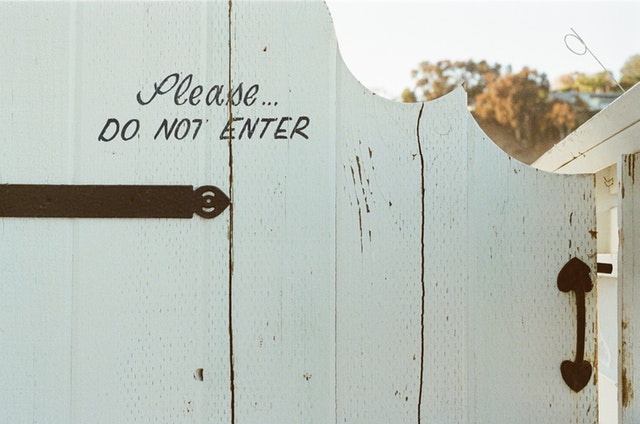Quite simply, we have become caterers of other people’s needs. I was among the first. Before, it was very difficult for me to say NO to people, especially those closest to me.
In my desire to please everyone, in addition to wasting time, I also lost parts of myself little by little, I left myself very little space and time for the things that filled my life and gave me pleasure. The more I pleased others, the more and more often I felt worse and more dissatisfied, I became more and more aggressive, angry and frustrated.
Also read this: Growth begins when we leave our comfort zone
The problem was in setting boundaries. I didn’t know what it meant to set a limit.
Psychology has a lot to say on this topic, as on any other, but I think the most important message is that with every “No” or “Yes” we set boundaries.
 The most important lesson I learned about boundaries is that boundaries are actually:
The most important lesson I learned about boundaries is that boundaries are actually:
A front door that we can close and lock and it is our duty to keep it closed for unwanted visitors.
Also read: Free yourself from emotional manipulators
A better quality of life begins with a clear No, that is, by clearly setting boundaries.
As a person who is always ready to help, do a task, jump in, I had to remind myself to stop, allow myself to be honest and ask myself:
Is this what I really want to do?
Also read this: Perfectionism – hunger for acceptance and love
Is this exhausting me?
Am I retaking a role that is not mine?
 Recognizing my emotions and being more aware of them, I was more often able to stop myself before falling into chaos, a drama from which there was hardly any return without consequences.
Recognizing my emotions and being more aware of them, I was more often able to stop myself before falling into chaos, a drama from which there was hardly any return without consequences.
Also read this: How to increase the feeling of satisfaction with life by practicing mindfulness
Many of us did not grow up with healthy boundaries, whether our parents’ boundaries weren’t good or we witnessed our mother’s or father’s loosening of boundaries. When the boundaries are not clear or not set, most often we have not acquired the knowledge that we are allowed to say “NO”.
Also read this: How dreams can help us solve everyday problems
Every unspoken “NO” can lead to situations that can trigger feelings of inferiority, which can result in a loss of self-esteem and self-confidence.
- Trust everyone or no one
- Not paying attention to other people’s boundaries
- When we go against our own values or rights to please others
- Falling in love with someone who rejects us
- Accepting gifts, food, sex that we don’t want
- Giving as much as you can as a sign of sacrifice
- Allowing others to dictate your life
Also read this: Do you digest or swallow your emotions?
- Allowing others to describe your reality
- Expecting others to meet your needs
- Allowing yourself to be taken advantage of
- “Decomposing” so that someone can take care of you

- We trust other people
- Step by step we achieve intimacy
- We are focused on ourselves and our needs
- We can say “NO” to gifts, sex and the like if we don’t want to
- Believing in your own decisions
Also read this: Seen or – the silent treatment in toxic relationships
- Defining your own truth
- Taking care of ourselves
- Self-respect
- Clear communication
The first step in setting boundaries is knowing ourselves, our needs, desires, opinions, and rights. The question helped me – Do I feel good while doing this or do I feel pressure to do something for someone (manipulation)?
Also read this: Emotional dependence – what is your love fix?!
When I knew what I was feeling, I could protect myself and my needs! When you feel frustrated or uncomfortable, check with yourself to see if your boundaries have been pushed. When you feel that your boundaries have been moved and you want to bring them back to an appropriate level, you need to say it clearly, say what your needs and feelings are that accompany the situation.
Also read this: What guarantees the duration of the partnership relationship?
Do not justify or apologize for the boundaries you set, be clear, as calm as possible and full of respect first for yourself and then for the other person.
 It’s OK to set boundaries even when the other person is uncomfortable and has feelings. You are not responsible for how the other person feels. When you set boundaries in past relationships, you are very likely to be called selfish, expect this!
It’s OK to set boundaries even when the other person is uncomfortable and has feelings. You are not responsible for how the other person feels. When you set boundaries in past relationships, you are very likely to be called selfish, expect this!
Also read this: Toxic relationships – an eye-opening experience – are we happier and smarter after them?
You and your limits will be tested!
Be prepared to get out of relationships where your boundaries are not respected. Learning how to set boundaries takes time, it’s a process that becomes easier and easier over time and eventually becomes automatic.
Follow SITO&REŠETO on social networks as well Facebook, Instagram i Twitter
Source: www.sitoireseto.com


